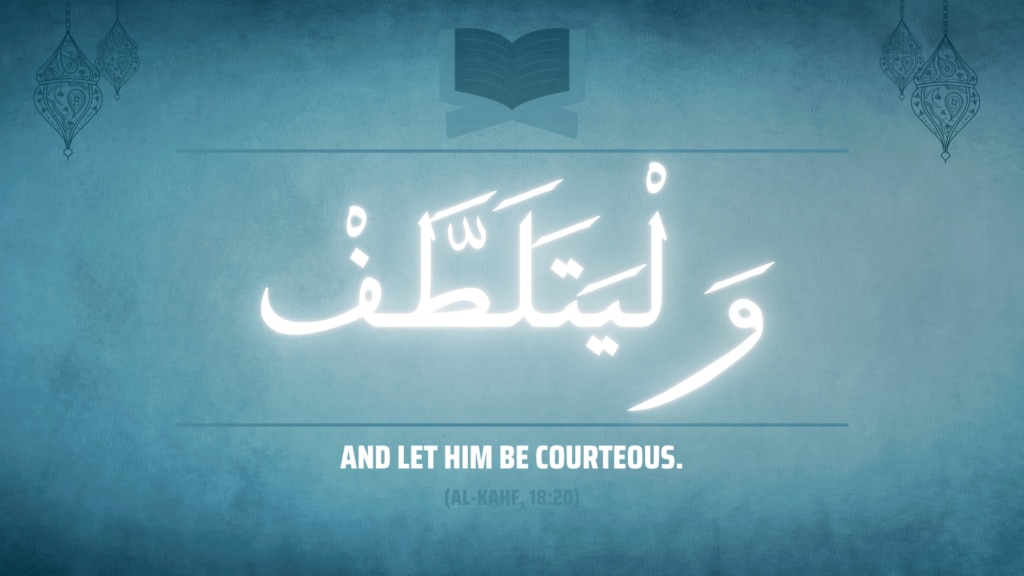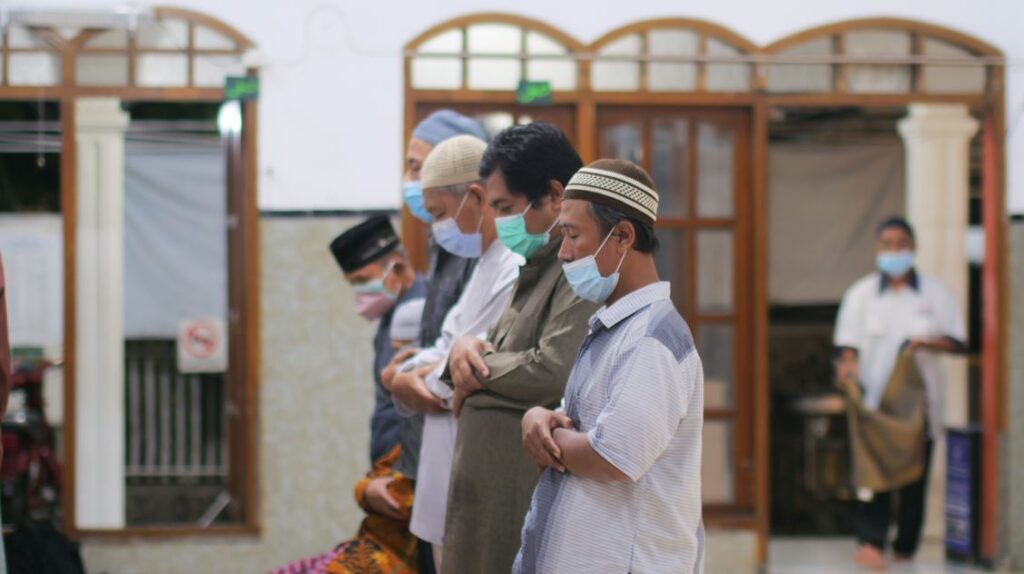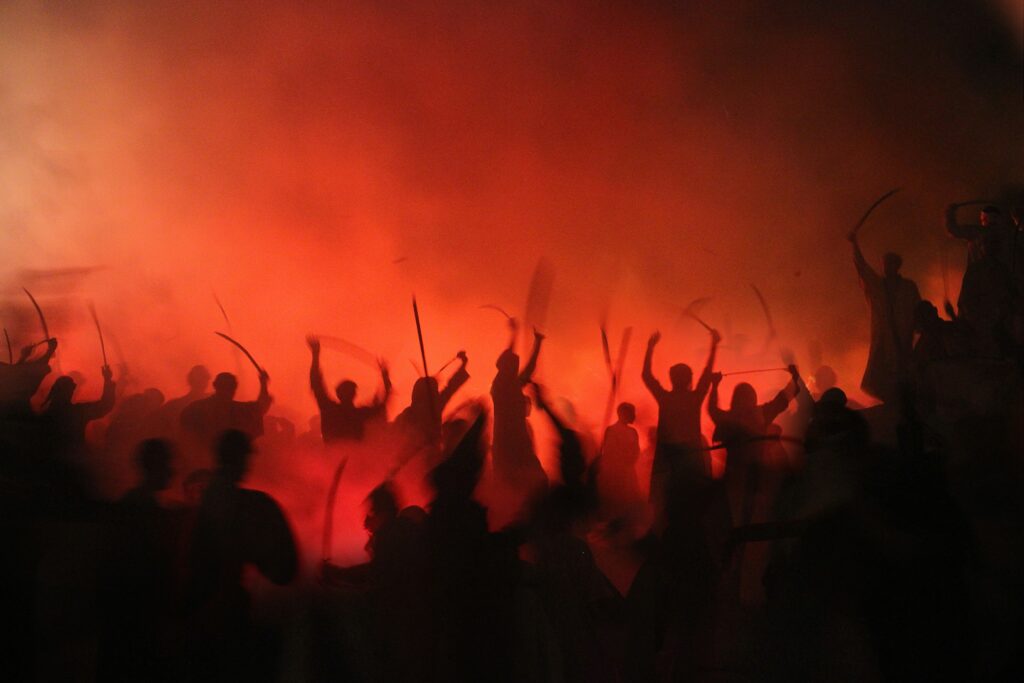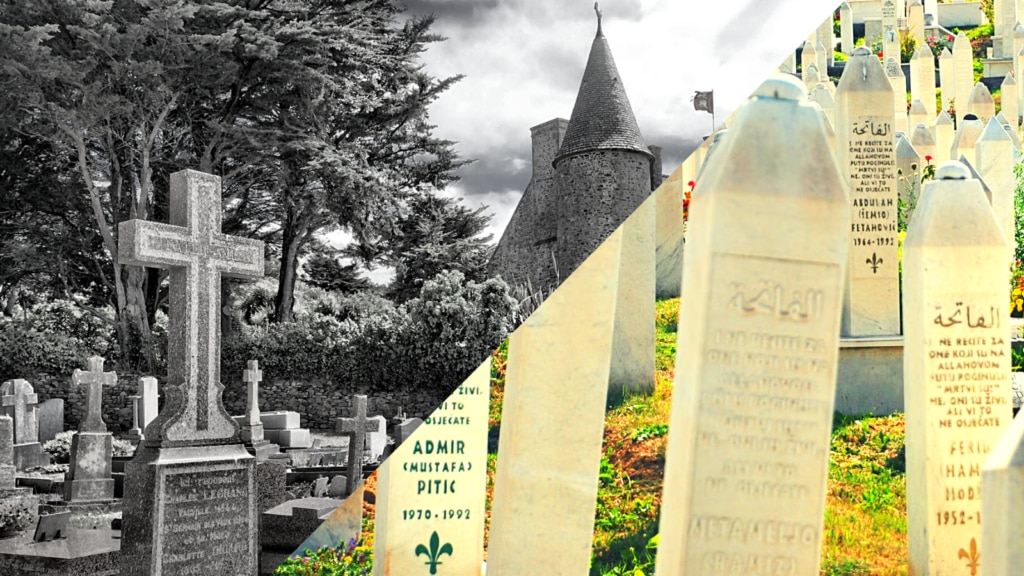Guidance regarding basic Islamic issues – which Hazrat Amirul Momineen, Khalifatul Masih Vaa has given on various occasions in his written correspondence and during MTA programmes – is being officially published below for everyone’s benefit
Division of the Holy Quran

Hazrat Amirul Momineen, Khalifatul Masih Vaa was asked in a letter whether there was a particular reason behind placing the phrase وَلْيَتَلَطَّفْ in the centre of the Holy Quran.
Huzooraa, in a letter dated 12 February 2021, gave the following response to this question:
“Allah the Exalted revealed the Holy Quran in the form of verses and surahs, and the Holy Prophetsa established their present order according to the guidance vouchsafed to him by God Almighty. The various kinds of division that took place at various times after the Holy Prophetsa was all done according to people’s own preferences and interpretation. This division does not affect the Holy Quran’s everlasting teachings and their profound spiritual meanings at all.
“The main purpose of the Quranic teachings is to propagate tawhid, the Oneness of God. When we consider the Holy Quran from this point of view, we can clearly see that the subject of the Oneness of Allah is mentioned at the beginning of the Holy Quran as well as the end of it. There is also a special emphasis on tawhid in the surahs that are in the middle of the Holy Quran i.e. Surah al-Kahf. The beginning and the end of this surah speak of the subject of tawhid in particular.
“In other words, the order of the Holy Quran seems to be informed by the following wisdom: By explaining the teachings of tawhid in various places in the Holy Quran, Allah the Exalted has conveyed the message to man that the secret of his success lies in making this Oneness of Allah the focal point of his transient life so that in the eternal life of the Hereafter, he may inherit the infinite bounty of God Almighty.”
Qunut during the Friday prayer

Hazrat Amirul Momineen, Khalifatul Masih Vaa was asked in a letter, “I am the imam, appointed to lead the prayers at my local mosque. I wish to observe the qunut during the Jumuah [Friday] prayer as we are currently passing through a pandemic and Ahmadis are also being persecuted in some countries. However, some of the members are objecting to it. I request your kind permission and guidance in this regard.”
Huzooraa, in a letter dated 12 February 2021, offered the following guidance regarding this issue:
“The Holy Prophetsa gave an extremely valuable piece of advice to the imam, who leads prayers. He said:
إِذَا صَلَّى أَحَدُكُمْ لِلنَّاسِ فَلْيُخَفِّفْ فَإِنَّ مِنْهُمْ الضَّعِيفَ وَالسَّقِيمَ وَالْكَبِيرَ وَإِذَا صَلَّى أَحَدُكُمْ لِنَفْسِهِ فَلْيُطَوِّلْ مَا شَاءَ
“‘When one of you leads the people in salat, he should shorten it for amongst them are the weak, the sick and the old; and if anyone among you prays alone then he may prolong (the prayer) as much as he wishes.’ (Sahih al-Bukhari, Kitab al-Azan)
“As far as observing qunut in prayers is concerned, the ahadith indicate that the Holy Prophetsa observed it for some time even when Muslims faced some calamity. Hence, on the occasions of [the incidents that took place at] Al-Raji and Bi‘r Ma‘unah, when a large number of the Companionsra were martyred by the enemies of Islam through dishonesty and deception, the Holy Prophetsa observed qunut against these opposing tribes for thirty days and prayed against them. (Sahih al-Bukhari, Kitab al-Maghazi)
“In addition to this, the Holy Prophetsa also taught the Companionsra the method of qunut during the witr prayer and for this, he also taught them various supplications. (Sunan Abi Dawud, Kitab al-Salat, Bab al-Qunut fi l-Witr)
“Therefore, one kind for qunut is that which is observed during the witr prayer and the other one is that which is observed due to special circumstances, such as when an affliction from an enemy befalls or when an epidemic etc. spreads.
“During the time of the Promised Messiahas, when the plague spread through Punjab in accordance with the prophecy given by Allah the Almighty, Huzooras, following the sunnah of the Holy Prophetsa, said:
“‘Nowadays, qunut should be recited in prayers due to the prevalence of the epidemic.’ (Al-Badr, No. 15, Vol. 2, 1 May 1903, p. 115)
“He also said: ‘Everyone should try to get up for Tahajjud and to include qunut in the five daily Prayers as well.’ (Malfuzat, Vol. 1, 2016, p. 192)
“Apart from this, Huzooras also instructed regarding the supplications [ad‘iyah] recited in qunut and instructed that only the ad‘iyah mentioned in the Holy Quran and the hadith should be recited in it. (Badr, No. 31, Vol. 6, 1 August 1907, p. 12)
“Regarding qunut, it should be kept in mind that it is masnun and not obligatory to recite it in the different prayers. Therefore, its observance cannot be declared mandatory. Moreover, the practice of observing qunut during prayers [salat] is substantiated by ahadith and the instructions of the Promised Messiahas, but there is no mention in any narration of it being observed in Friday prayers. Thus, such good deeds, in which others are also participating, should be carried out as far as permitted by the shariah so that nobody is overburdened beyond their capacity.”
Female prisoners of war and interest

Huzooraa was asked about the issue of physical relationships with female prisoners of war, and the views of Hazrat Khalifatul Masih IVrh and Malik Saif-ur-Rahman Sahib were presented regarding interest for guidance on both the issues.
In his letter dated 15 February 2021, Huzooraa replied as follows:
“Following the cruel actions of the enemies of Islam since its early days, Islam ultimately allowed for [defensive] wars, as a result of which, along with other spoils, the women of the enemy also came under the control of the Muslims as female prisoners of war. In light of some verses of Surah al-Nisa, my position is that conjugal relations could be established with those female prisoners of war only through nikah. Nevertheless, their consent was not required for this marriage, nor did this marriage affect the permission for a man to rightfully marry up to four women.
“You have mentioned your position on the issue of such female prisoners of war. As I wrote in my first reply (which has been published in [Al Hakam under] Answers to Everyday Issues, episodes IV & V), there are different views on this issue; Hazrat Khalifatul Masih IVrh was of the view that a nikah with such female prisoners of war was not necessary, while both types of positions are proven from Hazrat Khalifatul Masih IIra.
“In any case, whether a nikah used to take place or not, whatever method existed, everyone agrees that if such a female prisoner of war had a child, she would get the status of umm al-walad in the life of her master, which meant that the master could neither sell her nor give her to anyone else and after the death of the master such a woman would get full rights of freedom and she would be completely free.
“As far as the issue of interest is concerned, by the grace of Allah the Exalted, the Ahmadiyya Muslim Jamaat has always expressed its position at various times through the Jamaat’s scholars under the supervision of the Khalifa of the time after considering various aspects of this issue in light of the Holy Quran, the hadith and the guidance given by the Promised Messiahas. And even now, many issues related to interest are under consideration by the Jamaat.”
Praying for a friend who died as a non-Muslim

Hazrat Amirul Momineen, Khalifatul Masih Vaa was asked in a letter whether a person could pray for a friend who died as a Christian, a Hindu or a Buddhist but who had had good and loving sentiments for the Ahmadiyya Muslim Jamaat.
Huzooraa, in a letter dated 15 February 2021, provided the following reply to this question:
“As I wrote to you previously, Islam does not teach us to hate any humans, only to detest their evil deeds. As far as anyone’s going to Paradise or Hell is concerned, Allah the Exalted has kept this decision in His hands and has not given any human being in this world the right to pass judgement on whether someone is destined for Paradise or Hell. Nonetheless, it is true that sometimes Allah informs His prophets and messengers whether a particular person is destined for Heaven or Hell. However, Allah the Exalted alone decides whether that person would go to Heaven or Hell. Hence, Allah the Exalted describes this subject in the Holy Quran as follows:
“‘(As to) those who believe, and the Jews, and the Sabians, and the Christians, and the Magians and the idolaters, verily, Allah will judge between them on the Day of Resurrection; surely Allah is Witness over all things.’ (Surah al-Hajj, Ch.22: V.18)
“Then, Allah the Exalted also states in the Holy Quran that He does not waste the good deeds of any human being regardless of what religion he may belong to. Thus, He says:
“‘Surely, the Believers, and the Jews, and the Christians and the Sabians – whichever party (from among these truly) believes in Allah and the Last Day and does good deeds – shall have their reward with their Lord, and no fear (shall come) upon them, nor shall they grieve.’ (Surah al-Baqarah, Ch.2: Ch.63)
“So, there is no harm in paying condolences over the death of someone, in reciting the supplication of:
إِنَّا لِلّٰهِ وَإِنَّا إِلَيْهِ رَاجِعُونَ
“[‘Surely, to Allah we belong and to Him shall we return’] or in asking for the mercy of Allah the Exalted. One who recites:
إِنَّا لِلّٰهِ وَإِنَّا إِلَيْهِ رَاجِعُونَ
it even becomes a prayer for him as well because Allah the Exalted has instructed us to recite this prayer in case of any harm or loss. The purpose of this supplication is to express: ‘O Allah, remove this distress or make up for this loss.’ And when we offer this supplication upon the death of a person, one of the purposes may also be to say that, ‘O Allah, at the death of this person, I pray that You fulfil the expectations I had from him.’
“One may ask for Allah’s mercy for anyone because it is also up to Allah the Exalted to show mercy to anyone and He knows best when to show mercy to which person. Therefore, it is mentioned in the ahadith that one day, as a result of Allah’s mercy, Hell will be completely emptied. (Tafsir al-Tabari, Tafsir of Surah Hud verse 108)”
Usage of the word ‘heart’ in Islamic theology

Hazrat Amirul Momineen, Khalifatul Masih Vaa was asked in a letter, “When we speak of the ‘heart’ in religious and spiritual terms, does it refer to the human organ that circulates blood, or does it refer to the soul and the brain?”
Huzooraa, in a letter dated 26 January 2021, gave the following reply to this question:
“The words قلب [qalb] and فؤاد [fu‘ad] are commonly used in the Arabic language for the heart. The Holy Quran uses these two words both literally and metaphorically, for example, ‘veils on the hearts’, ‘crookedness or deviation of the hearts’, ‘hardening of the hearts’, ‘disbelief of the hearts’, ‘disease in the hearts’, ‘seal on the hearts’, ‘rusting of the hearts’, ‘denial of the hearts’, ‘wrath of the hearts’, ‘doubting of the hearts’, ‘hearts being blind’, ‘hearts reaching the throats’, ‘turning of the hearts’, ‘hearts not understanding’, ‘sinning or doing good of the hearts’, ‘hearts being oblivious to the remembrance of Allah’, ‘purity of the hearts’, ‘contentment of the hearts’, ‘having piety in the hearts’, ‘having strong hearts’, ‘intention of the hearts’, ‘faith entering the hearts’, ‘the revelation of the Word of God upon the hearts’, ‘hearts being free from worries’ and ‘seeing of the hearts’ etc. Similarly, in the ahadith, the word ‘heart’ has been used as a metaphor as well as in the literal sense.
“Therefore, the usage of this word in the Quran and the hadith with different meanings shows that in the religious and spiritual language, ‘heart’ does not just denote the physical organ that performs the function of circulating blood, rather it is also used as a metaphor to convey various meanings. It has numerous meanings such as soul, knowledge, understanding, intellect, intention, disposition, courage and primordial nature [fitrah], etc.
“Hence, Hazrat Musleh-e-Maudra states in his lexical analysis of the terms qalb and fu‘ad:
“‘Qalb […] means al-fu‘ad (the heart) […] and sometimes the term qalb also refers the intellect […] And by the word qalb, human states are described that are related to soul, knowledge and courage, etc. […] Qalb also denotes thinking and pondering.’ (Tafsir-e-Kabir, Vol. 1, p. 153)
“The Promised Messiahas states [with reference to كَتَبَ فِيۡ قُلُوۡبِهِمُ الۡاِيۡمَانَ (‘…. in whose hearts Allah has inscribed [true] faith…)], as mentioned in verse 23 of Surah al-Mujadalah]:
“‘By the inscribing of faith in the heart, it is meant that faith has entered into their heart’s desires and become a part and parcel of their nature, every insincerity having vanished away. This stage is reached when, assisted by the Spirit of holiness, a person attains a new life. As the constant presence of the soul in the body is a source of protection and light to it, so the Spirit of holiness of the new life should make its permanent habitation in the heart and cast a light upon it every hour and every moment, and as the soul gives life to the body, so the Spirit of holiness should be a source of life to the heart and all spiritual faculties. It is for this reason that in the verse quoted above, Almighty God has spoken of the assistance of the Spirit of holiness immediately after the statement that faith was inscribed in their hearts. For, when faith enters into the nature of man, he attains really a new life, and this new birth does not take place without the assistance of the Spirit of holiness. In short, the Holy Quran very frequently speaks of the spiritual or new life, and speaks of the true and perfect believers as the living and of the unbelievers as the dead, thus showing that the true believers obtain a new life by the entrance of the Spirit of holiness into their hearts while the disbelievers are not granted such life.’ (Aina-e-Kamalat-e-Islam, Ruhani Khazain Vol. 5, pp. 100-102)
“The Promised Messiahas also says:
“‘The Holy Quran states:
خَتَمَ اللّٰهُ عَلَى قُلُوبِهِمْ
“‘[Allah has set a seal on their hearts (Surah al-Baqarah, Ch.2: V. 8)]. The meaning of God’s setting a seal on their hearts is that when a person commits evil, the result of that evil is manifested on his heart and face by God Almighty. And that is also the meaning of the verse:
فَلَمَّا زَاغُوا أَزَاغَ اللّٰهُ قُلُوبَهُمْ
[Surah al-Saff, Ch.61: V.6]. That is, ‘When they deviated from the truth, Allah caused their hearts to deviate from the suitability to the truth.’ Eventually, under the influence of hostile zeal, a strange metamorphosis took place in them and they became so evil that it was as if they lost all previous identity and gradually the poison of selfish opposition suppressed the radiance from their fitrah.’ (Kitab-ul-Bariyyah, Ruhani Khazain Vol. 13, pp. 47-48)
“With regard to أَلَا بِذِكْرِ اللّٰهِ تَطْمَئِنُّ الْقُلُوبُ [Aye! it is in the remembrance of Allah that hearts can find comfort. (Surah al-Ra‘d, Ch.13: V.29)], the Promised Messiahas states:
“‘The general meaning of this is that hearts find comfort in the remembrance of Allah but its reality and philosophy is that when a person remembers Allah the Exalted with true sincerity and complete loyalty and believes himself to be in front of Him at all times, this creates a fear of Divine Greatness in his heart. That fear protects him from abominations and prohibitions and such a man progresses in piety and purity until the angels of Allah descend upon him and give him glad tidings and the door of revelation is opened to him. In that moment, it is as if he sees Allah the Exalted and sees [some of] His hidden powers. Thereafter, no sorrow can befall his heart and his natural disposition is always filled with joy and happiness.’ (Al Hakam, Vol. 9, No. 32, 10 September 1905, p. 8)
“Explaining the verse:
فِي قُلُوبِهِمْ مَرَضٌ فَزَادَهُمُ اللّٰهُ مَرَضًا
“[In their hearts was a disease, and Allah has increased their disease to them. (Surah al-Baqarah, Ch.2: V.11)] in Tafsir-e-Kabir, Hazrat Musleh-e-Maudra writes:
“‘In this verse, it is stated that their acting contrary to the sound nature [fitrat-e-sahihah] indicates that their hearts are diseased because if there was no disease in their hearts, they would at the very least be conscientious of those things that are born of the sound nature. Just as excess bile spoils the taste of mouth and makes even the sweet taste bitter, likewise those whose hearts are diseased cannot hear the voice of their fitrah properly.’ (Tafsir-e-Kabir, Vol. 1, p. 173)
“Thus, the Holy Quran, the hadith and the above-mentioned statements prove that in the theological and spiritual contexts ‘heart’ does not only denote the physical organ but the term also serves as a metaphor to convey various meanings.”
(Compiled by Zaheer Ahmad Khan, Head of Records Department, Private Secretariat, London. Translated by Al Hakam)

